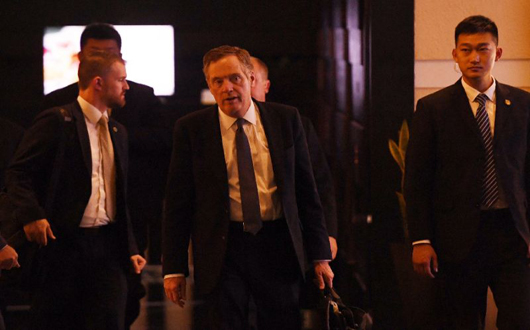WASHINGTON, July 11, 2018 (BSS/AFP) – The United States has escalated a
trade war with China, threatening to impose fresh tariffs on another $200
billion in Chinese goods as soon as September, sparking a furious reaction in
Beijing.
The latest shot in a spiralling trade conflict between the world’s top two
economies came just days after tit-for-tat tariffs on $34 billion in goods
came into effect.
Analysts have warned that ballooning trade tensions between the two
financial powerhouses could have a damaging impact on the global economy and
will have a far-reaching across the planet.
US Trade Representative Robert Lighthizer late Tuesday accused China of
retaliating to its tariffs “without any international legal basis or
justification.”
President Donald Trump has therefore ordered the trade department to
“begin the process of imposing tariffs of 10 percent on an additional $200
billion of Chinese imports,” Lighthizer said in a statement.
Officials will hold hearings in late August on the list of targeted
products and an administration official said it would take about two months
to finalise, at which point Trump would decide whether to go ahead with the
levies.
The eventual goal is to impose tariffs on 40 percent of Chinese imports,
the same proportion of US goods hit by Beijing’s retaliation, an official
told reporters.
If the measures are imposed, it would mean new taxes on thousands of
products from fish to chemicals, metals and tires.
Reacting to the Washington announcement, a senior trade official in
Beijing accused the United States of “damaging the world economic order” and
said tit-for-tat tariffs would “destroy” trade between the rival powers.
“The outburst of large-scale mutual levying of tariffs between China and
the United States will inevitably destroy Sino-US trade,” assistant minister
of commerce Li Chenggang told a forum in Beijing.
US policy “actually interferes with the process of economic globalisation”
and “damages the world economic order,” charged Li.
The dispute comes on top of Washington’s confrontation with other allies and
major trading partners including Canada, Mexico and the European Union, after
it imposed steep tariffs imposed on their steel and aluminum. Those nations
have also retaliated.
“It is a chaotic time in international trade,” said China’s Li.
The new trade frictions sent investors running for cover, with equity
markets across Asia tumbling more than one percent.
– ‘Unfair practices’ –
The trade confrontation between Washington and Beijing has been escalating
for months, despite Trump’s repeated statements that he has a good
relationship with China’s President Xi Jinping.
China accused the US of starting “the largest trade war in economic
history,” after the first round of tariffs took effect last week.
But Trump has said continuously that China has taken advantage of the US
economy, and he has vowed to hit nearly all the country’s products with
tariffs, as much as $450 billion.
The US trade deficit in goods with China ballooned to a record $375.2
billion last year, stoking his anger.
For now, the USTR continues to work on the process of finalising an
additional $16 billion in goods to face 25-percent tariffs to bring the total
up to $50 billion. Beijing has vowed to retaliate accordingly.
The new list of goods to face 10-percent punitive duties includes frozen
meats, live and fresh fish and seafood, butter, onions, garlic and other
vegetables, fruits, nuts, metals, and a massive list of chemicals, as well as
tires, leather, fabrics, wood and paper.
The officials said they tried to target goods that would reduce the harm
to US consumers.
They also said they remain open to working with China to try to resolve
the dispute, but the response from Beijing so far has been unsatisfactory.
“For over a year, the Trump Administration has patiently urged China to
stop its unfair practices, open its market, and engage in true market
competition,” Lighthizer said.
“Unfortunately, China has not changed its behavior.”
But he added that “the United States is willing to engage in efforts that
could lead to a resolution of our concerns.”



